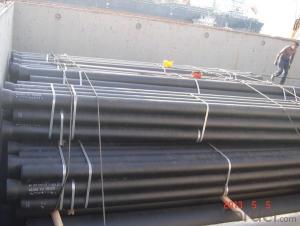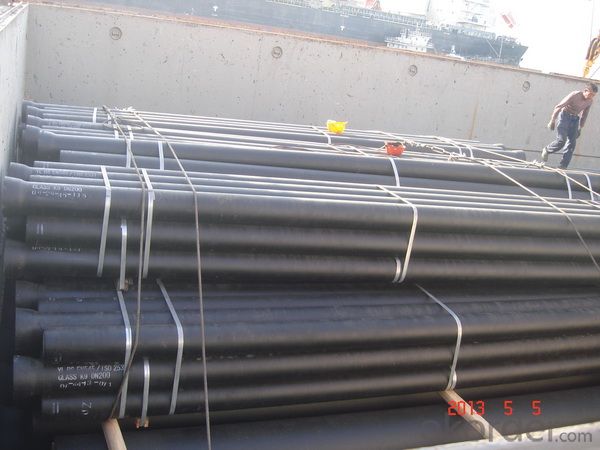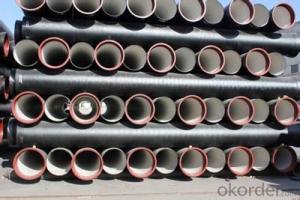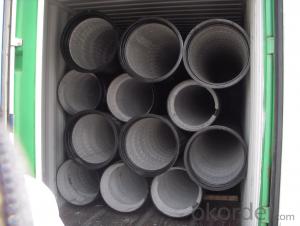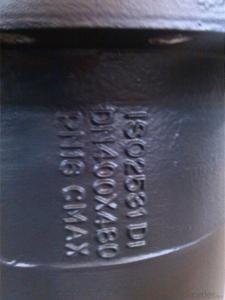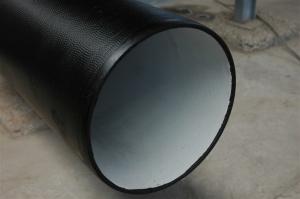DUCTILE IRON PIPE C DN 80
- Loading Port:
- Tianjin
- Payment Terms:
- TT OR LC
- Min Order Qty:
- -
- Supply Capability:
- 30000Tons m/month
OKorder Service Pledge
OKorder Financial Service
You Might Also Like
CNBM ductile iron pipe ranges from DN80-DN1600mm (T-Type, Class K9), effective length 6m, comply with ISO2531 Standard
Company Profile
CNBM International Corporation is the leading production base and renowned supplier of Ductile Iron Water Pipe systems of both potable and waste water in China. We are constantly looking to develop high quality products to ensure the longest service life and wonderful performance.
CNBM Pipelines regard quality as the essential factor leading to successful business. Every pipe is tested in accordance with BS EN545 (water application) or BS EN598 (sewer application). CNBM Pipelines products comply with and are tested according to the relevant European and International Standards. Our pipes are manufactured under the quality management system BS EN ISO 9001. After years of efforts, CNBM Pipelines has built up great reputation in terms of quality and service among customers worldwide
Product Introduction
CNBM ductile iron pipe ranges from DN80-DN1600mm (Tyton, T-Type, Class K7/K8/K9), effective length: 6m, complying with BS EN545/EN598/ISO2531/BS4772.
Specification& Payment terms
Internal lining: Pipes shall have an internal cement mortar lining in acc with ISO4179.
External coating: Pipes shall be externally coated with metallic zinc spray plus a further layer of resin painting to ISO8179.
Gasket: 100% SBR/NBR/EPDM gasket in accordance with ISO4633.
Packing: Pipes from DN100 to DN300 be bundled with steel belts, the others are in bulk.
Payment term: By 30% T/T advance payment + 70% Irrevocable L/C at sight.
Packing: In bulk vessel or in container.
- Q: Can ductile iron pipes be used for mining applications?
- Mining applications can indeed utilize ductile iron pipes. These pipes possess exceptional mechanical properties, including high tensile strength, impact resistance, and durability. As a result, they are well-suited for a range of challenging environments, including mining operations. The pipes are capable of withstanding substantial loads and pressures, making them ideal for the transportation of water, slurry, and other fluids utilized in mining processes. Moreover, ductile iron pipes have a smooth internal surface that minimizes friction and promotes the efficient flow of materials. Consequently, they find extensive use in tasks such as dewatering, tailings disposal, and the transport of corrosive or abrasive substances within the mining industry. Overall, due to their strength, durability, and suitability for demanding conditions, ductile iron pipes offer a dependable and cost-effective choice for mining applications.
- Q: Is the cast iron pipe buried in need of antiseptic treatment? What kind of anticorrosive materials are used?
- It must be antiseptic. Usually hot asphalt brush painted two times, winding glass fiber cloth two road, cross construction.
- Q: How do ductile iron pipes handle ground movement near rivers and lakes?
- Ductile iron pipes are highly suitable for handling ground movement near rivers and lakes. Their inherent flexibility and durability make them resistant to ground instability. They can withstand minor shifts and settle with the movement without cracking or breaking. Additionally, their sturdy construction and high tensile strength allow them to adapt to changing soil conditions, ensuring the integrity and longevity of the pipeline system in these areas.
- Q: What is the expected thermal expansion of ductile iron pipes?
- Several factors, including the iron's composition, temperature range, and pipe length, can affect the expected thermal expansion of ductile iron pipes. Generally, these pipes have a coefficient of thermal expansion between 10 and 13 µin/in/°F. This implies that for every one degree Fahrenheit rise in temperature, the ductile iron pipe will expand by around 10 to 13 microinches per inch in length. It is worth mentioning that this estimation is approximate and may slightly differ based on the pipe's specific conditions and characteristics.
- Q: What are the common methods for flow control in ductile iron pipes?
- The common methods for flow control in ductile iron pipes include the use of valves, such as gate valves, butterfly valves, and check valves. These valves are designed to regulate the flow of water or other fluids in the pipe, allowing for control and adjustment of the flow rate. Additionally, flow control can also be achieved through the use of flow meters and flow regulators, which monitor and regulate the flow of fluids through the pipe system.
- Q: What is the expected pressure rating for ductile iron pipes?
- The expected pressure rating for ductile iron pipes can vary depending on various factors such as the pipe diameter, wall thickness, and the specific application it is being used for. However, generally speaking, ductile iron pipes are designed and manufactured to withstand high-pressure conditions. They are commonly used in water and wastewater systems, where they can typically handle pressures ranging from 150 psi (pounds per square inch) up to 350 psi or even higher. It is important to consult the manufacturer's specifications or relevant industry standards for specific pressure ratings based on the pipe's size and application to ensure safe and reliable operation.
- Q: How does ductile iron pipe perform in areas with high groundwater salinity?
- Ductile iron pipe performs well in areas with high groundwater salinity due to its inherent corrosion resistance properties. The high levels of salinity in the groundwater can cause corrosion and deterioration of certain materials, but ductile iron is highly resistant to this type of corrosion. Its composition and manufacturing process make it less susceptible to damage from corrosive elements, such as salt and minerals present in high salinity water. The corrosion resistance of ductile iron pipe is primarily attributed to its protective iron oxide coating, which forms naturally on the interior and exterior surfaces of the pipe. This coating acts as a barrier, preventing direct contact between the pipe and the corrosive elements in the groundwater. Additionally, ductile iron pipes are often lined with cement mortar or a protective epoxy coating, which further enhances their resistance to corrosion and provides an additional layer of protection. Furthermore, ductile iron pipe has a long lifespan, often exceeding 100 years, which makes it ideal for areas with high groundwater salinity. Its durability and resistance to corrosion ensure that it can withstand the harsh conditions associated with high salinity environments, minimizing the need for frequent repairs or replacements. In summary, ductile iron pipe is an excellent choice for areas with high groundwater salinity due to its corrosion resistance properties. Its protective iron oxide coating, coupled with optional linings, provides a reliable and long-lasting solution, ensuring the integrity and performance of the pipe system even in challenging environments.
- Q: Are ductile iron pipes suitable for use in cooling water systems?
- Ductile iron pipes are indeed appropriate for utilization in cooling water systems. They exhibit remarkable strength and durability, rendering them impervious to the intense pressure and corrosive properties inherent in such systems. Furthermore, they possess the ability to withstand extreme fluctuations in temperature while delivering enduring performance. Additionally, ductile iron pipes exhibit commendable resistance to the proliferation of microorganisms, a crucial aspect in preserving the quality of the cooling water. Moreover, these pipes facilitate effortless installation and necessitate minimal maintenance, thereby constituting a cost-effective alternative for cooling water systems. In summary, ductile iron pipes represent a dependable and suitable choice for employment in cooling water systems.
- Q: How do ductile iron pipes perform in high-velocity water flow conditions?
- Ductile iron pipes perform excellently in high-velocity water flow conditions. Their inherent strength and durability allow them to withstand the force and turbulence of fast-flowing water without any significant issues. These pipes have been extensively tested and proven to maintain structural integrity, resist erosion, and minimize the risk of leaks or bursts, making them a reliable choice for high-velocity water flow applications.
- Q: Do ductile iron pipes require special maintenance?
- Indeed, special maintenance is necessary for ductile iron pipes. Despite their reputation for being strong and durable, ductile iron pipes are still vulnerable to specific types of corrosion. To prevent corrosion and extend the pipes' lifespan, regular maintenance is crucial. This maintenance typically involves conducting periodic inspections to identify any signs of corrosion or damage, as well as implementing cleaning and protective coating procedures. Furthermore, it is important to handle and install the pipes correctly to maintain their integrity. By regularly maintaining the pipes and adhering to industry best practices, one can prevent leaks, breaks, and other issues, ultimately saving valuable time and money in the long term.
Send your message to us
DUCTILE IRON PIPE C DN 80
- Loading Port:
- Tianjin
- Payment Terms:
- TT OR LC
- Min Order Qty:
- -
- Supply Capability:
- 30000Tons m/month
OKorder Service Pledge
OKorder Financial Service
Similar products
Hot products
Hot Searches
Related keywords
